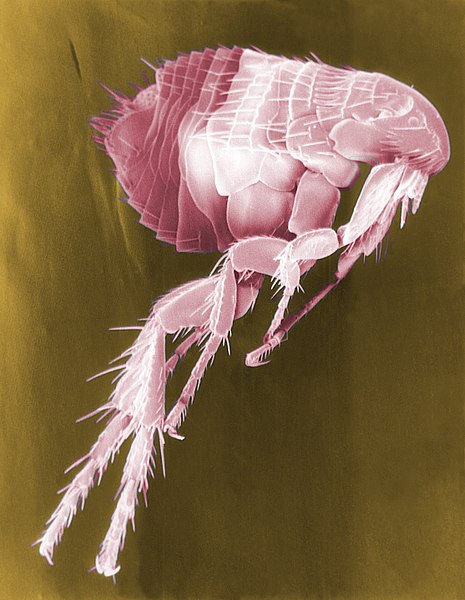Parasites can afflict pets any time of the year, however during the spring and summer months, they tend to be more prevalent. Our pets spend a lot more time outside when the weather is warm, and parasites breed more readily. Even if your pets spend all or most of their time indoors, it is possible for parasites to find them whether carried in on our clothes or by crawling through our screen doors. Here are some common parasites to look out for and ways to combat them this summer.
Fleas
 Fleas are the most common parasite to affect dogs and cats, and they can be a pain to humans, too, if not kept under control. Fleas can be one of the most difficult parasites to get rid of once they find their way into your home. They can live in unseen in carpet and furniture, and they survive for long periods of time without a host. Contrary to popular belief, they can survive the cold so your pet is NOT safe from fleas over the winter. Pets can get fleas even if they do not go outside, so it’s best to take preventative measures to avoid an infestation.
Fleas are the most common parasite to affect dogs and cats, and they can be a pain to humans, too, if not kept under control. Fleas can be one of the most difficult parasites to get rid of once they find their way into your home. They can live in unseen in carpet and furniture, and they survive for long periods of time without a host. Contrary to popular belief, they can survive the cold so your pet is NOT safe from fleas over the winter. Pets can get fleas even if they do not go outside, so it’s best to take preventative measures to avoid an infestation.
Treatment & Prevention
- Treat them with a proven flea medication such as Frontline, Biospot, Advantage, or a strong shampoo. You can ask a vet’s advice on which medication will suit your pet best. Continue preventative treatment for fleas on your pet even after all signs of them have been eliminated, to avoid reinfestation.
- Help to eliminate an established flea population in your house with flea powder for carpets, flea traps, or foggers for the entire house. Be sure to follow instructions on foggers, powders and sprays closely for the safety of your family and pets.
Ticks
 Ticks can be a big problem. They are can carry Lyme Disease and Rocky Mountain Spotted Fever. Ticks attach and gorge on their host’s blood for several days. They often go unnoticed for days until they become fully engorged, giving it plenty of time to your infect your pet. Check your dog or cat thoroughly when the come inside from grassy, brushy or wooded areas. You can comb through your pet’s fur and be sure to check the ears, toes and other “folds”. Ticks can be harder to find on longer-haired animals or animals that are dark in color. If they’re attached already, you can remove ticks with a pair of tweezers, but do so carefully to avoid leaving the tick’s head in your pet’s skin. Call your vet if you’re concerned about removing a tick, they’ll be happy to help. Flea and tick treatments such as Frontline and Advantage will not repel or prevent ticks from attaching to your pet, but the parasites will be killed before they can do any major harm. You may also choose to have your pet vaccinated for Lyme Disease annually as a further precaution.
Ticks can be a big problem. They are can carry Lyme Disease and Rocky Mountain Spotted Fever. Ticks attach and gorge on their host’s blood for several days. They often go unnoticed for days until they become fully engorged, giving it plenty of time to your infect your pet. Check your dog or cat thoroughly when the come inside from grassy, brushy or wooded areas. You can comb through your pet’s fur and be sure to check the ears, toes and other “folds”. Ticks can be harder to find on longer-haired animals or animals that are dark in color. If they’re attached already, you can remove ticks with a pair of tweezers, but do so carefully to avoid leaving the tick’s head in your pet’s skin. Call your vet if you’re concerned about removing a tick, they’ll be happy to help. Flea and tick treatments such as Frontline and Advantage will not repel or prevent ticks from attaching to your pet, but the parasites will be killed before they can do any major harm. You may also choose to have your pet vaccinated for Lyme Disease annually as a further precaution.
Mosquitoes and Biting Flies
Mosquitoes and flies don’t just go after people. they can be a problem for your pets too, especially if you live near wooded areas or water. These insects can cause itchy bumps and allergic reactions, but mosquitoes and flies can also be vectors of disease and other parasites including West Nile Virus and Heartworm.
Treatment & Prevention
Some ways to combat flying biters this summer include:
- Prevent standing water after a rain to eliminate breeding venues and preventing larva from developing.
- Burn citronella torches or candles when you and your pet are outside
- Apply Frontline, Advantix, or a similar treatment or even an herbal insect repellent to your pet to keep insects at bay
- Keep your pet inside at dusk, dawn and other times when mosquitoes are most active
Worms
While not just a warm weather concern, it’s worth mentioning worms since your pets will probably be out and about more often. If you took your pet to the vet when he/she was a baby, more than likely your veterinarian gave your buddy a de-wormer to rid them of worms. Even so, dogs and cats can contract these parasites later in life by ingesting or otherwise being exposed to eggs in the outside environment.
There are many types of worms, but the most common species to affect pets are hookworms, roundworms, and tapeworms. Worms have the potential to be transmitted to people as well, so it’s important to treat your pet to prevent the spread of these parasites. Some symptoms of a worm infection are unexplained weight loss, lethargy, diarrhea (may be bloody), vomiting, increased appetite, itchiness (of the rear) and bloating. You may even see evidence of worms in your pet’s vomit or feces that resemple rice or or small, rectangular white bits. These are segments of tape worms!
Treatment & Prevention
If you suspect your pet may have worms, arrange to have a stool sample examined by your vet for conformation and proper treatment. Commercial de-wormers are also available, but pay strict attention to dosages if you choose to medicate at home. These parasites are easy to eliminate,and can usually be wiped out quickly with one or two treatments. Keep infected pets away from kids and other pets, if possible, until the treatment is over, and be sure to stay on top of waste pick-up to prevent future infections.
Until next time, keep your pets safe with preventative treatments this summer!
 That Pet Blog That Pet Place Pet Blog
That Pet Blog That Pet Place Pet Blog



Lisa Richards is an professional in digestive overall health and the
author of the Ultimate Candida Diet system.
My wweb blog :: magicmtcs.com (Don)